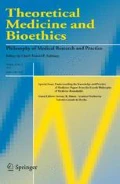Abstract
Ethical vegans and vegetarians believe that it is seriously immoral to bring into existence animals whose lives would be miserable. In this paper, I will discuss whether such a belief also leads to the conclusion that it is seriously immoral to bring human beings into existence. I will argue that vegans should abstain from having children since they believe that unnecessary suffering should be avoided. After all, humans will suffer in life, and having children is not necessary for a good life. Thus vegans, and probably vegetarians as well, should not have children. I will consider several objections against this controversial claim, show why the objections fail and conclude that it would be best for ethical vegans to abstain from procreation.
Similar content being viewed by others
Notes
One might ask what unnecessary suffering means here. Unnecesssary suffering refers to suffering that one could easily live without inflicting on anyone. For instance, if the only way to save your life is to cause you to suffer, then the suffering is not unnecessary.
I thank Matti Häyry for pressing me on this.
References
Räsänen, Joona. 2021. Liberal utilitarianism – yes but for whom? Cambridge Quarterly of Healthcare Ethics 30: 368–375. https://doi.org/10.1017/S0963180120000894.
Moen, Ole Martin. 2016. The ethics of wild animal suffering. Etikk I Praksis - Nordic Journal of Applied Ethics 10: 91–104. https://doi.org/10.5324/eip.v10i1.1972.
Akerma, Karin. 2014. Ist der vegetarismus ein antinatalismus? Pro Iure Animalis. <https://www.pro-iure-animalis.de/index.php/antinatalismus/articles/ist-der-vegetarismus-ein-antinatalismus.html Accessed 17 Aug 2021.
Pelley, Virginia. 2018. This extreme sect of vegans thinks your baby will destroy the Planet. Marie Claire Magazine. 29 Jan 2018. Accessed 8 April 2021. https://www.marieclaire.com/culture/a14751412/antinatalism/.
Bentham, Jeremy. 1982. [1789]. In An introduction to the principles of morals and legislation. eds. Burns James and Herbert Hart. London and New York: Methuen.
Sneddon, Lynne. 2004. Evolution of nociception in vertebrates: comparative analysis of lower vertebrates. Brain Research Reviews 46: 123–130. https://doi.org/10.1016/j.brainresrev.2004.07.007.
Harrison, Peter. 1992. Descartes on animals. The Philosophical Quarterly 42: 219–227. https://doi.org/10.2307/2220217.
Miller, Calum. 2021. Do animals feel pain in a morally relevant sense? Philosophia 49: 373–392. https://doi.org/10.1007/s11406-020-00254-x.
Mason, Jim and Peter Singer. 1980. Animal factories. New York: Harmony Books.
Hsiao, Timothy. 2017. Industrial farming is not cruel to animals. Journal of Agricultural and Environmental Ethics 30: 37–54. https://doi.org/10.1007/s10806-017-9652-0.
Häyry, Matti. 2021. Just better utilitarianism. Cambridge Quarterly of Healthcare Ethics 30: 343–367. https://doi.org/10.1017/S0963180120000882.
People for the Ethical Treatment of Animals. "Animals used for food." PETA. https://www.peta.org/issues/animals-used-for-food/ Accessed 3 Sept 2021.
Regan, Tom. 1983. The case for animal rights. University of California Press.
Benatar, David. 2006. Better never to have been: the harm of coming into existence. Oxford: Oxford University Press.
Moen, Ole Martin. 2021. Pessimism counts in favor of biomedical enhancement: A lesson from the anti-natalist philosophy of P. W. Zapffe. Neuroethics 14: 315–325. https://doi.org/10.1007/s12152-021-09458-8.
Häyry, Matti. 2004. A rational cure for prereproductive stress syndrome. Journal of Medical Ethics 30: 377–378. https://doi.org/10.1136/jme.2003.004424.
Häyry, Matti. 2005. The rational cure for prereproductive stress syndrome revisited. Journal of Medical Ethics 31: 606–607. https://doi.org/10.1136/jme.2005.011684.
Rachels, Stuart. 2014. The immorality of having children. Ethical Theory and Moral Practice 17: 567–582. https://doi.org/10.1007/s10677-013-9458-8.
Hereth, Blake and Anthony Ferrucci. 2021. Here’s not looking at you, kid: a new defence of anti-natalism. South African Journal of Philosophy 40: 14–33. https://doi.org/10.1080/02580136.2020.1871566.
Mill, John Stuart. 1998. [1861]. Utilitarianism. Roger Crisp (ed.), Oxford University Press.
Hansen, Thomas. 2012. Parenthood and happiness: a review of folk theories versus empirical evidence. Social Indicators Research: An International and Interdisciplinary Journal for Quality-of-Life Measurement 108: 29–64. https://doi.org/10.1007/s11205-011-9865-y.
Stanca, Luca. 2012. Suffer the little children: measuring the effects of parenthood on well-being worldwide. Journal of Economic Behavior & Organization 81: 742–750. https://doi.org/10.1016/j.jebo.2010.12.019.
Glass, Jennifer, and Simon Robin and Matthew Andersson. 2016. Parenthood and happiness: Effects of work-family reconciliation policies in 22 OECD countries. American Journal of Sociology 122: 886–929. https://doi.org/10.1086/688892.
Lafollette, Hugh. 1980. Licensing parents. Philosophy and Public Affairs 9: 182–197.
Singer, Peter. 1972. Famine, affluence, and morality. Philosophy and Public Affairs 1: 229–243.
Ord, Toby. 2015. Moral trade. Ethics 126: 118–138. https://doi.org/10.1086/682187.
Diamond, Cora. 1978. Eating meat and eating people. Philosophy 53: 465–479. https://doi.org/10.1017/S0031819100026334.
Häyry, Matti. 2020. Causation, responsibility, and harm: how the discursive shift from law and ethics to social justice sealed the plight of nonhuman animals. Cambridge Quarterly of Healthcare Ethics 29: 246–267. https://doi.org/10.1017/S096318011900104X.
Author information
Authors and Affiliations
Corresponding author
Additional information
Publisher’s note
Springer Nature remains neutral with regard to jurisdictional claims in published maps and institutional affiliations.
Rights and permissions
Springer Nature or its licensor (e.g. a society or other partner) holds exclusive rights to this article under a publishing agreement with the author(s) or other rightsholder(s); author self-archiving of the accepted manuscript version of this article is solely governed by the terms of such publishing agreement and applicable law.
About this article
Cite this article
Räsänen, J. Should vegans have children? Examining the links between animal ethics and antinatalism. Theor Med Bioeth 44, 141–151 (2023). https://doi.org/10.1007/s11017-023-09613-7
Published:
Issue Date:
DOI: https://doi.org/10.1007/s11017-023-09613-7



